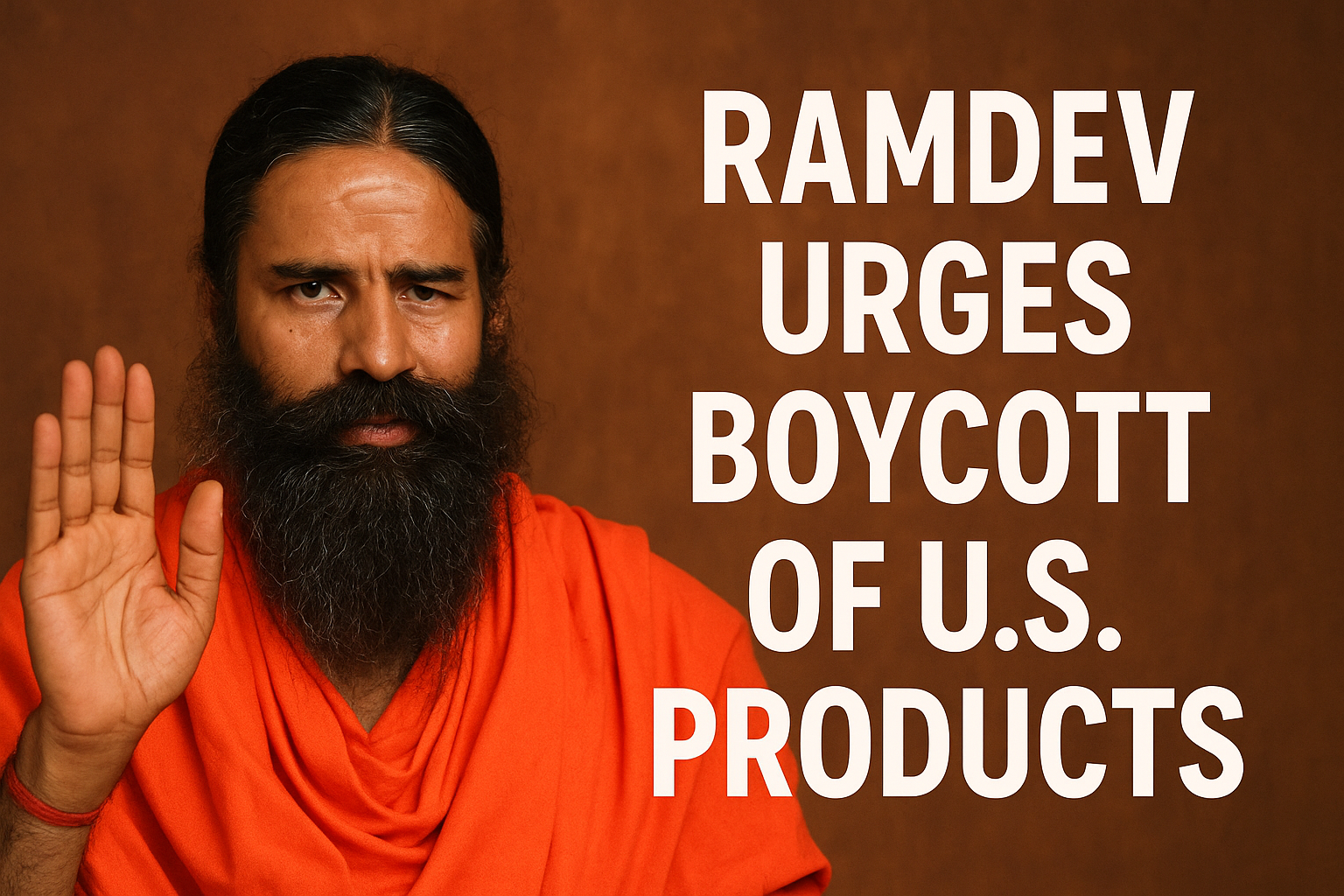The ongoing trade tensions triggered by former US President Donald Trump’s tariff policies have now found a strong voice of protest in India. Yoga guru and Patanjali founder Baba Ramdev has urged Indians to completely boycott American products, arguing that no Indian citizen should be seen “standing at the counters of US brands.” His remarks highlight both a nationalist economic sentiment and a revival of the Swadeshi call that has historically shaped India’s consumer choices.
What Sparked the Boycott Call?
The trigger comes amid escalating concerns over tariff threats from Trump’s camp, which are expected to impact India’s trade competitiveness. Trump has often spoken about imposing stricter trade restrictions on imports, including from India, which could hurt sectors like IT, textiles, and pharmaceuticals.
Responding to this, Ramdev said that Indians should not only resist reliance on US products but also embrace local and indigenous alternatives to strengthen domestic industries. His statement comes at a politically sensitive time, with both economic nationalism and consumer behavior under the spotlight.
Ramdev’s Message: Reject American Brands
In his sharp remarks, Ramdev said:
- “No Indian should be seen at the counters of American brands.”
- He emphasized the need for economic self-reliance.
- He added that India has enough capacity, talent, and resources to not depend on foreign products.
This reflects his consistent advocacy of the Swadeshi movement, which has been the foundation of Patanjali Ayurved’s brand positioning against multinational corporations.
Why This Matters to Indian Consumers
Ramdev’s boycott call is not just symbolic. It raises critical questions about how Indian consumers may respond if tariff disputes escalate:
- Price Impact – Tariffs imposed by the US could indirectly influence India’s economy, potentially making American products more expensive for local consumers.
- Market Shift – A widespread boycott could push Indian buyers toward domestic alternatives in FMCG, personal care, food, and retail segments.
- Nationalist Sentiment – Similar to the earlier “Boycott China” campaigns, Ramdev’s appeal taps into emotions around patriotism and economic independence.
Economic and Political Context
Trump’s tariff stance has been a global talking point. While aimed primarily at protecting American jobs, the policy has ripple effects in trade-heavy countries like India. If tariffs are reimposed or heightened, Indian exporters could face reduced competitiveness in the US market.
Domestically, the boycott message ties into a larger political narrative of Atmanirbhar Bharat (Self-Reliant India), promoted heavily by the government. With Patanjali and other homegrown brands in the spotlight, Ramdev’s comments may further boost the conversation on strengthening local supply chains.
Swadeshi Revival: Symbolism or Practical Reality?
While calls for boycotts resonate strongly on a cultural level, their real impact on consumer behavior is often mixed. Multinational corporations in India, including American giants in food, fashion, and electronics, hold significant market shares. Experts note that:
- Sustainability of Boycott – Initial enthusiasm often fades if domestic alternatives do not match in quality or price.
- Global Interdependence – In today’s interconnected markets, a complete boycott of foreign products is challenging.
- Political Messaging – Beyond economics, boycott calls can serve as political tools, strengthening nationalist sentiment.
Nonetheless, Ramdev’s statement adds weight to a long-standing debate in India—whether embracing Swadeshi fully is realistic in a globalized economy.
Key Takeaways
- Trump’s tariff threats have sparked fears of trade restrictions impacting India.
- Baba Ramdev has urged Indians to boycott American products and avoid supporting US brands.
- The appeal is tied to Swadeshi and Atmanirbhar Bharat ideologies.
- Its actual economic impact depends on consumer behavior and market realities.
Frequently Asked Questions
Why did Baba Ramdev call for a boycott of U.S. products?
Baba Ramdev urged Indians to boycott American products in response to the tariff scare created by Donald Trump’s proposed trade policies. According to him, relying on U.S. brands weakens India’s self-reliance, and he believes a nationwide boycott can strengthen Indian companies and reduce foreign economic pressure.
What did Ramdev say about Indian consumers and U.S. brands?
Ramdev specifically appealed to citizens by saying that “no Indian should be seen at counters of American brands.” He linked consumer choices to patriotism, stressing that every rupee spent on foreign goods adds to U.S. profits while harming India’s economy.
Is this boycott officially backed by the Indian government?
No, this call for boycott is not an official government directive. It is Ramdev’s personal appeal as a spiritual leader and entrepreneur. However, his statements often gain significant public attention because of his influence in the fields of yoga, Ayurveda, and consumer products through Patanjali.
How does this connect to Trump’s tariff scare?
Trump’s tariff policies have raised concerns about trade imbalances and increased import costs for several Indian sectors. Ramdev sees this as a wake-up call for India to reduce dependence on U.S. products and instead focus on strengthening domestic industries and exports.
Which U.S. brands are most affected by this appeal?
While Ramdev did not name specific companies, his remarks imply popular American brands in sectors like fast food, beverages, technology, and retail. Multinational chains that have large consumer bases in India—such as McDonald’s, KFC, Coca-Cola, Pepsi, Starbucks, Apple, and Nike—could be perceived as targets of this sentiment.
What has been the public reaction to Ramdev’s statement?
Public reactions are mixed. Some Indians support the call, saying it promotes self-reliance and aligns with the “Vocal for Local” movement. Others criticize it as impractical in a globalized economy where U.S. products are deeply integrated into daily life.
Can boycotting U.S. products really impact India’s economy?
Economists argue that while symbolic boycotts may raise awareness about supporting local products, completely rejecting U.S. brands would be difficult. India’s trade and economic ecosystem is interconnected, and such boycotts can create both challenges and opportunities for domestic industries.

